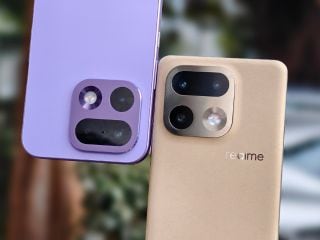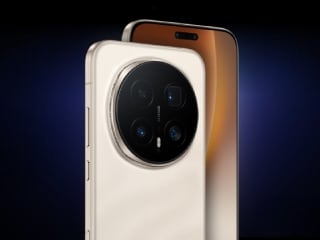- Home
- Smart home
- Smart home Reviews
- Trifo Max Pet Robot Vacuum Cleaner Review
Trifo Max Pet Robot Vacuum Cleaner Review
The Trifo Max series robots can use their navigation cameras for surveillance, letting you check in on your home from anywhere.

The Trifo Max Pet has a rated suction power of 4,000pa
Although new to India with its range of cleaning robots, Trifo was established in 2016 as an AI home robot manufacturer. The company now has a growing worldwide presence, including in India, where the Trifo Max series of high-end cleaning robots was launched in September. Priced at Rs. 32,900 onwards, the Trifo Max series isn't among the most affordable options in the growing cleaning robot segment in India, but it isn't too expensive either.
On review here is the Trifo Max Pet robot vacuum cleaner, the more powerful of the two models launched. Priced at Rs. 36,900, the Trifo Max Pet has a rated suction power of 4,000pa, and a unique feature that not too many devices can claim to have – robotic surveillance, using the navigation camera. Is the Trifo Max Pet a useful robot to have in your home? Find out in our review.
![]()
The Trifo Max Pet comes with a 'pet hair extractor' fitting, meant specifically for vacuuming animal fur
What is the Trifo Max Pet, and what's in the box?
The Trifo Max series is available in two models - a standard one for Rs. 32,900, and the Trifo Max Pet for Rs. 36,900. The big differences between the two are higher suction power of 4,000pa on the Pet variant, along with a pet hair extractor fitting that replaces the main brush. This makes the Trifo Max Pet suitable if you have pets that shed fur in your home, although the additional vacuuming power is a welcome feature even if you don't.
There are two buttons at the top that can be used to control power, or to instruct the Trifo Max Pet to start and stop cleaning, or go to its dock. There is an additional Reset button under the lid, along with a USB Type-A port which interestingly can be used to charge other devices through the robot's 5,200mAh battery. The Max Pet has a single camera at the top for navigation and surveillance, as well as a speaker and microphone for operational voice prompts as well as two-way communication when using the app.
The core functionality of sweeping and vacuuming is similar to what's promised by the other cleaning robots I've reviewed recently. For sweeping, the Trifo Max Pet has a single rotating brush which pushes dirt and particles towards the vacuum zone, which then sucks it in. The rated suction power of 4,000pa is considerably higher than the 3,000pa on the standard Trifo Max model, as well as on most competing devices, including the much more expensive Milagrow iMap 10.0, and the Mi Robot Vacuum-Mop P.
You can have the Trifo Max Pet mop your floors as well, but this functionality is quite rudimentary. A non-electronic fitting needs to be affixed to the bottom of the robot manually with velcro pads, and drips water onto the floor while mopping it with a fabric attachment as the robot moves along. This is a very basic and uninspiring way for a robot to mop the floor, and isn't particularly effective – but more on that later.
Included with the Trifo Max Pet are a single sweeping brush fitting, a removable main brush made of rubber with bristles, a charging dock, a wall adapter, a removable dust compartment, and a ‘pet hair extractor' fitting, which can be used instead of the main brush to vacuum fur directly into the dust compartment without the hassle of it getting tangled up in the main brush. Trifo also sent me a mop fitting separately, along with multiple replaceable mop cloths.
Trifo Max Pet navigation
Unlike the Mi Robot Vacuum-Mop P and 360 S7 which use LiDAR for navigation at around the same price, the Trifo Max Pet uses a top-mounted camera. Apart from letting the device see where it's going, map the home, and avoid obstacles, the camera is also used to enable the stand-out feature on the Trifo Max Pet – video surveillance. When used with the app, it's possible to view your home from anywhere, and even drive the robot around to be able to look into different rooms.
![]()
The camera is used for navigation as well as video surveillance through the Trifo Home app
The device is capable of keeping itself safe from falls thanks to sensors at the bottom, and this worked well during the review period. It can climb low obstacles such as the edges of fixed rugs or joints in the flooring, but as with similar devices, will need you to remove loose rugs and anything with tassels from its path.
Camera-based navigation is clunkier and less accurate than LiDAR-based navigation, and this does indeed show on the Trifo Max Pet. The robot would often choose odd paths to reach where it needed to get to, get stuck under low furniture, or bump into things such as the legs of a sofa rather violently. Thankfully, the shock-absorbing bumper ensured that this didn't damage the robot at all. Even the cleaning patterns were inefficient, with the Max Pet often spending too much time moving around and trying to avoid insignificant obstacles, rather than actually cleaning quickly and efficiently.
Trifo Max Pet app
A smart cleaning robot wouldn't really be smart without an app, and Trifo does have a dedicated app to control its devices, including the Max series. The Trifo Home app is available for iOS and Android and lets you control most of the Max Pet's functions. These include starting and stopping cleaning tasks, video surveillance, battery and location monitoring, vacuum suction power adjustment, scheduling, and more. Usefully, you can also link the Trifo Max Pet to Alexa, and control certain functions through voice commands.
The app allows for mapping your home, but it isn't possible to save this information. Instead, the Trifo Home app only saves the map from the last cleaning task, starting afresh every time you send the Max Pet out to clean. The only thing you can use the map for is to quickly send the robot to a location in your home, but then to clean an area you'll have to drive it around using the manual control mode. There's no scope for defining zones or restricted areas, and the Trifo Max Pet will, by default, clean everywhere it can physically reach. The only way to make it clean only one specific room is to close all the doors after putting the robot in.
The app comes in particularly handy for the video surveillance features. You can start and watch video and audio feeds from the device using the app, while manually driving the robot around to see different parts of the house. There is also a motion detection option, which can automatically begin recording video. Although the camera isn't very good and the video feed is noisy and quite rough, this is a useful feature to have. You can watch the video feed at any time, but you'll have to have the Trifo Max in manual control mode to also use the audio feed.
![]()
The main cleaning brush can be swapped out with the pet hair extractor when needed
While the app serves its purposes capably enough when functional, I did often have connectivity issues with both the Trifo Max Pet and the app. There were four occasions (a couple of these occasions lasted for over a day) over the course of five weeks when the app showed connectivity errors, making it impossible to control the robot. I was able to start and stop cleaning tasks using the buttons on the robot itself in these cases, but the inability to use the app meant that I couldn't remotely control the device, check the battery level, or use the video surveillance functionality.
This also led to some very bothersome issues, for instance the robot would start and stop randomly, as commands from the app were delayed in reaching it. The frequency of these issues suggests that Trifo still has some work to do; they made the Trifo Max Pet quite a bother to use, and could lead to larger problems if they occur while the user is away from home and not in an immediate position to take manual control of the device.
Trifo Max Pet cleaning
With up to 4,000pa of vacuum suction power, the Trifo Max Pet is the most powerful cleaning robot I've used so far. This isn't just a number; the robot really does have the ability to pull in dirt and impurities quickly, including larger and heavier debris such as paper shreds, food crumbs, and all kinds of dust. The only downside to all of that vacuuming power is the noise – the Trifo Max Pet can get very loud, and you'll have to reduce the vacuum power to make it a bit softer. Even at around 75 percent power though, the Trifo Max is still very effective in cleaning.
All the dust and dirt gets sucked into a suitably large dust compartment, which I needed to empty out every few days. I also needed to clean out the filter to keep the suction and exhaust smooth. Unlike on competing devices, there's no brush included to clean the filter, and I often had to get my hands dirty in the process of getting the dirt out.
![]()
Interestingly, the Trifo Max Pet has a USB Type-A port that can be used to charge other devices, making it a rolling power bank of sorts
Trifo sent me the mop fitting and pads separately, but the company states that these are ordinarily provided with the device. The fitting is rather simple and fixes onto the bottom of the device using velcro strips, making it a very rudimentary ‘patched-on' type of solution. The water reservoir doesn't have much capacity and isn't electronically controlled by the robot; it simply drips water onto the pad gradually. The water usually ran out in around 15 minutes, meaning the Max Pet wasn't able to effectively mop my 600-square-foot apartment.
Trifo Max Pet battery life and charging
Considering that the Trifo Max Pet is a powerful robot vacuum, and streaming live video and audio feeds will consumer power, it's quite useful that the Trifo Max Pet has a large 5,200mAh battery. A single cleaning of my home usually had the battery drop to around 65 percent from a full charge, and it took less than an hour to get the battery level back up to full from that point, suggesting that a full charge should take around three hours. You can also use the Trifo Max Pet as a rolling power bank to charge your other devices, if that's something you need.
This meant that I never had battery life issues with the Trifo Max Pet cleaning my 600-square-foot home at full power, even though the robot did seem to choose paths inefficiently, running for longer than needed as a result. It should be possible to clean a 1,500-square-foot home in a single charge, and the Trifo Max Pet is capable of resuming cleaning where it left off if it runs out of power mid-cleaning.
Charging is through a contact-based docking station, which needs to be placed on the floor. The Trifo Max Pet's docking station isn't very big or heavy, and this was occasionally a problem because the device itself would cause the dock to shift out of position, sometimes making it difficult for the robot to return to.
The Trifo Max Pet is able to return to the dock on its own from wherever it is, provided it started from there or has direct line-of-sight with it. I did have some trouble during power cuts, for example the Trifo Max Pet left the dock and started driving around searching for it, instead of staying put as it should.
![]()
The mop fitting attaches to the bottom of the Trifo Max Pet using velcro strips, and does a rudimentary and ineffective job
Verdict
The Trifo Max Pet is perhaps the most unique of the robot vacuum cleaners I've used recently, but this doesn't make it the best. The video surveillance feature is quite interesting and will appeal to a lot of buyers, and the sheer suction power of the device gives it an edge, but the Trifo Max Pet isn't without its issues. The ineffective mopping, unintelligent navigation, unreliable connectivity, and other minor oddball bugs all hold the Trifo Max back.
While the device is officially priced at Rs. 36,900, I have been seeing it discounted to less than Rs. 30,000 during the recent sales, while the standard Max model is available for even less. At these prices, the Trifo Max series might be worth considering despite their issues. Of course, paying more for options such as the ILife A9s or 360 S7 might make more sense for the overall experience.
Price (MRP at the time of writing): Rs. 36,900
Update: Soon after the time of writing this review, the MRP of the Trifo Max Pet was revised to Rs.27,000, with an offer price of Rs. 24,000 which Trifo states will be valid till the end of 2020. At the revised price, the Trifo is, in my opinion, a product worth considering despite its shortcomings, and has a price advantage over some of the aforementioned competition.
Rating: 6/10
Pros:
- Powerful vacuum cleaning
- Good battery life
- Video and audio surveillance and communication features
Cons:
- Ineffective mopping
- Frequent app connectivity issues
- Crude navigation capabilities
- Very loud
How to find the best deals during online sales? We discussed this on Orbital, our weekly technology podcast, which you can subscribe to via Apple Podcasts, Google Podcasts, or RSS, download the episode, or just hit the play button below.
Get your daily dose of tech news, reviews, and insights, in under 80 characters on Gadgets 360 Turbo. Connect with fellow tech lovers on our Forum. Follow us on X, Facebook, WhatsApp, Threads and Google News for instant updates. Catch all the action on our YouTube channel.
Related Stories
- Samsung Galaxy Unpacked 2025
- ChatGPT
- Redmi Note 14 Pro+
- iPhone 16
- Apple Vision Pro
- Oneplus 12
- OnePlus Nord CE 3 Lite 5G
- iPhone 13
- Xiaomi 14 Pro
- Oppo Find N3
- Tecno Spark Go (2023)
- Realme V30
- Best Phones Under 25000
- Samsung Galaxy S24 Series
- Cryptocurrency
- iQoo 12
- Samsung Galaxy S24 Ultra
- Giottus
- Samsung Galaxy Z Flip 5
- Apple 'Scary Fast'
- Housefull 5
- GoPro Hero 12 Black Review
- Invincible Season 2
- JioGlass
- HD Ready TV
- Laptop Under 50000
- Smartwatch Under 10000
- Latest Mobile Phones
- Compare Phones
- OPPO K14x 5G
- Samsung Galaxy F70e 5G
- iQOO 15 Ultra
- OPPO A6v 5G
- OPPO A6i+ 5G
- Realme 16 5G
- Redmi Turbo 5
- Redmi Turbo 5 Max
- Asus Vivobook 16 (M1605NAQ)
- Asus Vivobook 15 (2026)
- Brave Ark 2-in-1
- Black Shark Gaming Tablet
- boAt Chrome Iris
- HMD Watch P1
- Haier H5E Series
- Acerpure Nitro Z Series 100-inch QLED TV
- Asus ROG Ally
- Nintendo Switch Lite
- Haier 1.6 Ton 5 Star Inverter Split AC (HSU19G-MZAID5BN-INV)
- Haier 1.6 Ton 5 Star Inverter Split AC (HSU19G-MZAIM5BN-INV)
-
 Arc Raiders' Update 1.15.0 Adds New Event, Map Condition and Cosmetics
Arc Raiders' Update 1.15.0 Adds New Event, Map Condition and Cosmetics
-
 Realme 16 Pro, Realme 15 Price in India to Be Hiked From February 11 Due to Rising Component Costs: Report
Realme 16 Pro, Realme 15 Price in India to Be Hiked From February 11 Due to Rising Component Costs: Report
-
 Google Is Reportedly Bringing Personal Intelligence to NotebookLM
Google Is Reportedly Bringing Personal Intelligence to NotebookLM
-
 Honor Magic 9 Series Tipped to Launch With Significant Battery Upgrade Over Magic 8 Models
Honor Magic 9 Series Tipped to Launch With Significant Battery Upgrade Over Magic 8 Models




![[Partner Content] OPPO Reno15 Series: AI Portrait Camera, Popout and First Compact Reno](https://www.gadgets360.com/static/mobile/images/spacer.png)





